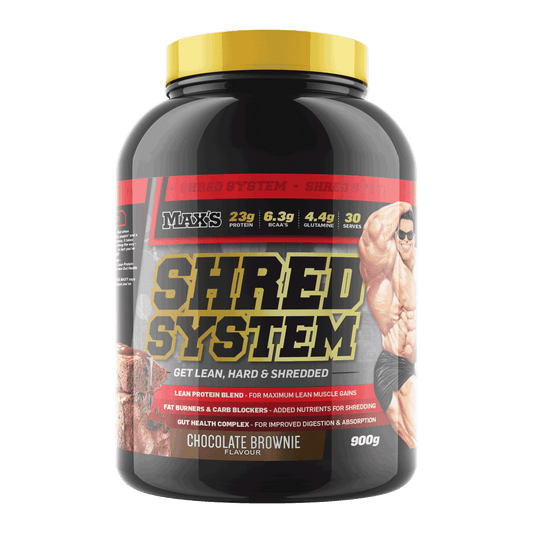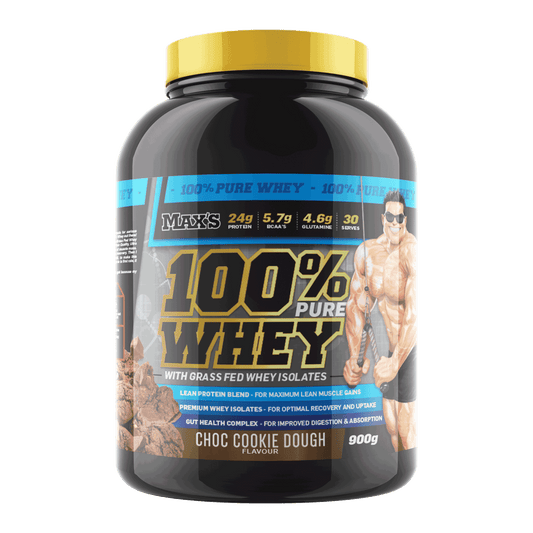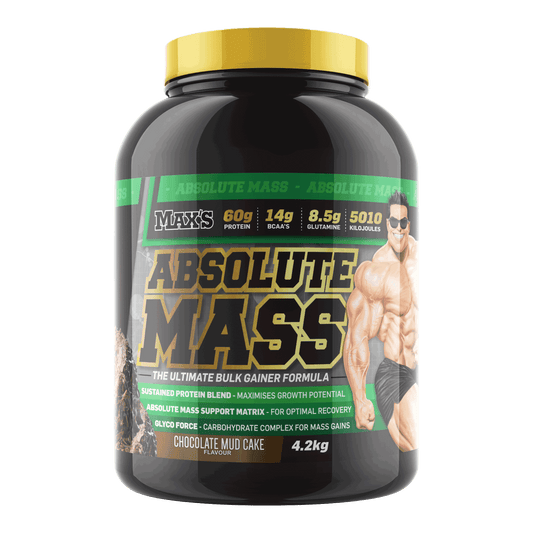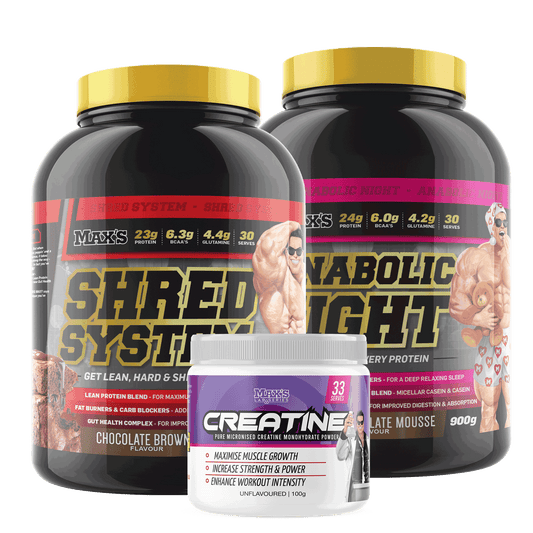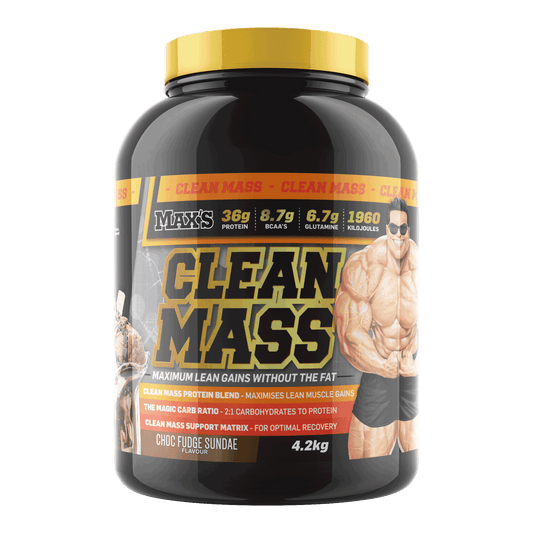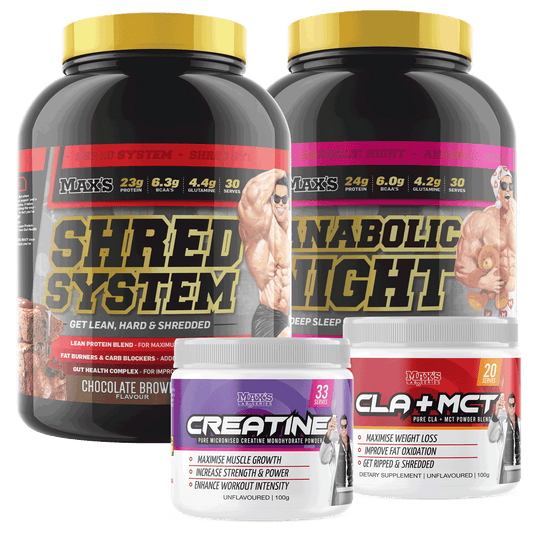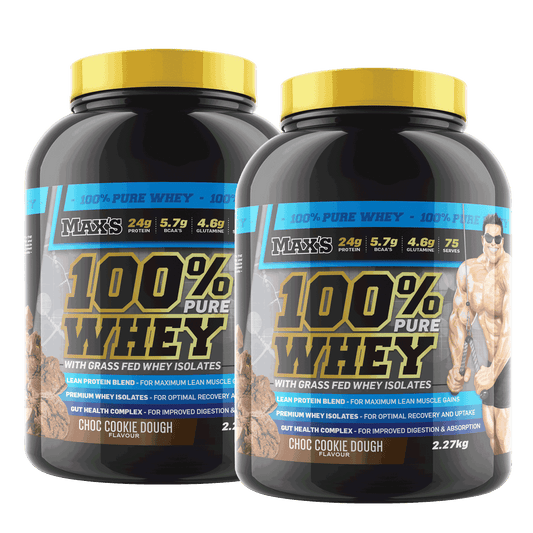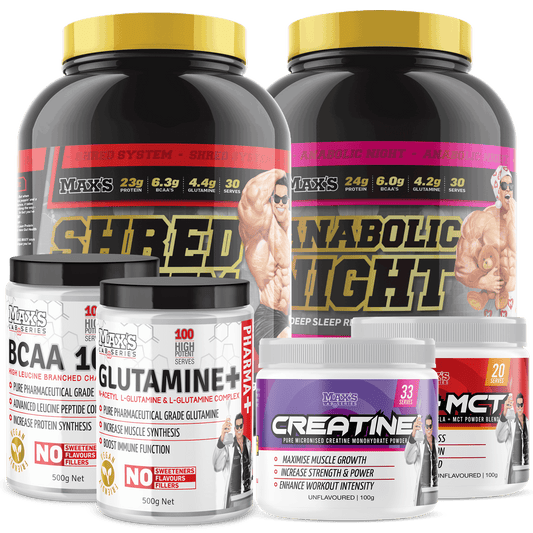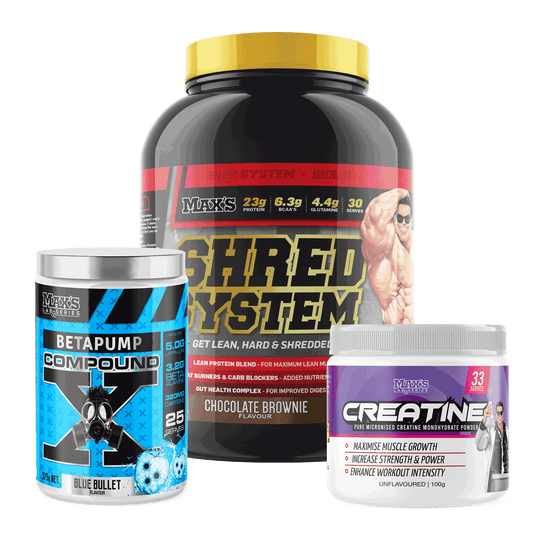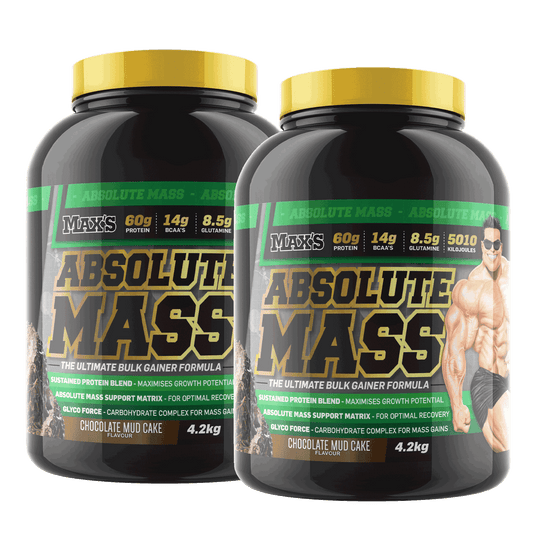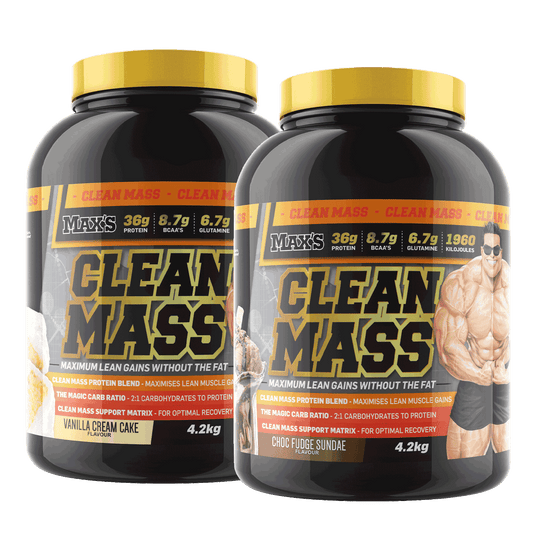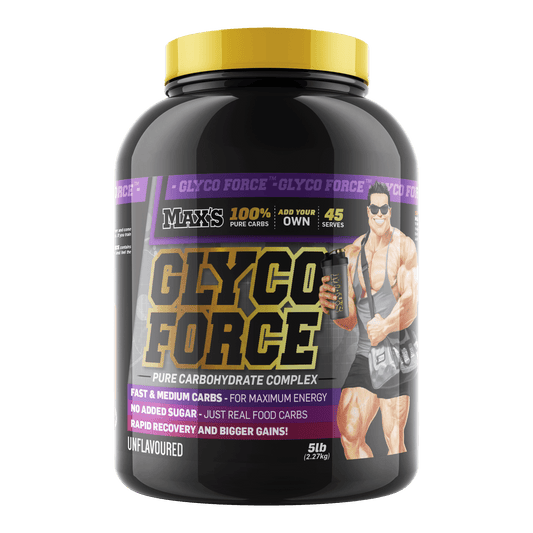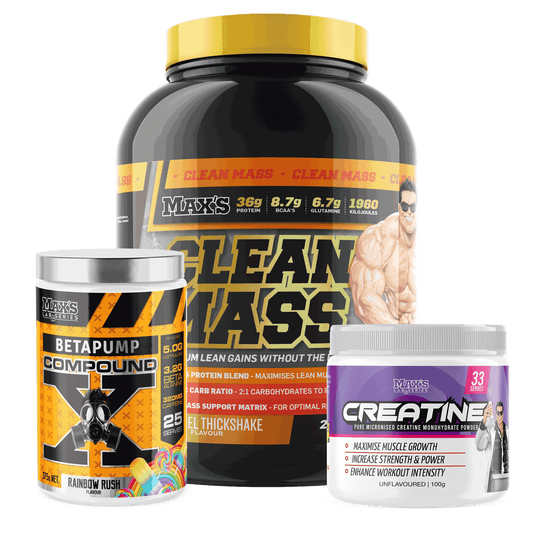100% AUSTRALIAN-MADE PROTEIN POWDER
Boosting your protein intake with protein powders is one of the best ways to promote weight loss, muscle growth, and repair. But not all powders can give you the desired results, so you need high-quality, science-backed protein.
At MAX’S, we’ve been developing effective, science-based proteins since 1989. Founded by Australian Bodybuilding Champion Keith Ellis and Sports Scientist and Nutritionist Paul Kirkham, we’re 100% Australian-owned and operated and have a reputation for two things: great quality and great taste.
As one of the leading sports nutrition suppliers, we have an extensive range of premium-quality Australian-made protein powders to help you get superior results. From fast-acting whey isolates to slow-release casein to whey protein concentrate, mass gainers, bulk protein powder and fat burners – you’ll find the supplement to fit your needs.
WHAT’S THE BEST PROTEIN POWDER FOR ME?
Still new to the whole protein supplements business? We're here to help you get familiar with the most well-known types of protein.
-
Whey Protein Powder. The ideal choice for those who want to boost protein intake or those looking to build muscle. Whey Protein Powder contains an optimum blend of amino acids for building and maintaining human muscle, including the essential Branched Chain Amino Acids (BCAA's) that help regulate natural protein synthesis.
Whey Protein is derived from milk and comes in two main forms: Whey Protein Isolate (WPI) and Whey Protein Concentrate (WPC).
-
Whey Protein Isolate (WPI). This form of whey is the purest, fastest-acting, and most expensive. It is generally recommended when a fast-digesting and absorbing protein is required—for example, after workouts to quickly replenish trained muscle and promote fast recovery. WPI is very high in protein content—It usually contains over 90% protein.
-
Whey Protein Concentrate (WPC). Like WPI, WPC is also derived from milk. WPC is slightly less purified than WPI and contains around 80% protein. It is a great all-around protein with an excellent balance of function, cost, and absorption . It is the most widely used whey protein by athletes for these reasons.
WPC has an excellent profile of amino acids for building and repairing muscle and is generally classed as a medium-digesting protein, making it great for use at any time during the day. It can also be added to other foods to boost their protein quality and is commonly found in products like protein bars.
Many protein supplements combine WPI and WPC to provide the nutritional benefits of both products.
-
Casein Protein. Casein Protein is another milk-derived protein with different properties to whey. While the amino acid profile of casein protein is good for muscle growth, it's not quite as good as whey. However, casein has some other benefits that whey does not. Casein protein has a structure that forms a gel in your digestive tract, which slows digestion and absorption. This has several advantages in certain situations:
- Because it's slow digesting, casein leaves you feeling fuller for longer - which is great if you take a casein-based protein as part of a weight loss diet.
- Slow-digesting proteins like casein are better for taking in the evening before bed because they drip-feed your muscles with amino acids for many hours to give your body more time to recover and grow.
Due to their gelling properties, casein proteins are often included in slow-release protein formulas, nighttime formulas, and dessert mousse-type formulas.
-
Fat Burners. Perfect for those looking to lose unwanted fat. Fat burners are an all-encompassing term that describes a range of nutrients and compounds that help boost your body's natural fat-burning metabolism. Fat burners generally fall under a few different categories:
- Thermogenic nutrients: The term "thermogenic" literally means to produce heat. Thermogenic nutrients boost your metabolism, which burns calories and produces heat. Some examples of nutrients that fall into this category include caffeine, green tea, and capsaicin.
Carb Blockers: Certain nutrients or compounds can interfere with specific body biochemistry to inhibit fat storage. For example, the fruit Garcinia Cambogia contains a compound known as Hydroxycitric Acid (HCA) that has been shown to stop the conversion of excess carbohydrates into fat.
Fat Metabolisers: Another class of fat burners helps your body mobilise fat stores and burn this released fat for energy. For example, a herb called Coleus Forskolin Can help stimulate the release of fatty acids from your adipose tissue. In contrast, another fat metaboliser, L-Carnitine, helps transport fats to muscle cells, which can be used for fuel.
A good fat-burning formula will generally take a multi-pronged approach by combining different fat burners for optimum results.
-
Mass Gainers. The best option for those training to build maximum size, strength and power, Mass Gainers generally consist of a blend of carbohydrates and proteins, plus a range of other nutrients designed to help trainers pack on size, strength and muscle as fast as possible.
We all understand the importance of protein in building muscle. But what many trainers don't realise is that carbohydrates are just as important in building mass. Carbs provide the energy we need for hard training and the nutrient energy your body needs to recover, replenish, and grow between workouts.
A good Mass Gainer should contain about 20 - 30% of a high-quality protein like Whey, a good serving of clean carbs like maltodextrins, glucose, dextrose, or other food-based carbs, vitamins and minerals, plus other special nutrients like BCAAs for recovery or creatine and MCTs for energy.
-
Lean Gainers. Similar to mass gainers, but has lower carb content and thus less fat gains. Best for people who want to build mass but without the fat.
THE BEST BULK PROTEIN POWDERS FOR EVERY GOAL
When it comes to protein powders, different types are suitable for different goals. Here are some recommendations based on specific fitness objectives:
Goal: Fat Loss
Protein Powder: Fat Burners
Fat burners are protein powders that contain ingredients to stimulate metabolism and promote fat burning. They often include additional compounds like caffeine, green tea extract, or thermogenic ingredients to support weight loss efforts. These powders can also help preserve muscle mass during a calorie-restricted diet.
Goal: Maximum Size, Strength, and Power
Protein Powder: Mass Gainers
Mass gainers are high-calorie protein powders designed for individuals who struggle to consume enough calories to support muscle growth. They typically contain a combination of protein, carbohydrates, and fats to provide a calorie surplus and fuel intense workouts.
Goal: Building Mass with Lower Carb Content
Protein Powder: Lean Gainers
Lean gainers are similar to mass gainers but with a lower carbohydrate content. They are suitable for individuals who want to build muscle mass while minimising fat gains. Lean gainers provide a balanced ratio of protein, carbohydrates, and fats to support muscle growth without excessive calorie intake.
Goal: Boosting Protein Intake or Building Muscle
Protein Powder: Whey Protein or Whey Protein Isolate
Whey protein is a popular choice for increasing protein intake and supporting muscle growth. The body quickly absorbs it and contains essential amino acids. Whey protein isolate is more concentrated, has a higher protein content, and has fewer carbohydrates and lactose.
Goal: Meal Replacement and Sustained Fullness
Protein Powder: Casein Protein
Casein protein is a slow-digesting protein that sustains amino acid release. It can keep you feeling fuller for longer, making it a suitable option for meal replacements or as part of a nighttime shake. Combining casein with whey protein post-workout can further enhance muscle recovery.
Remember that protein powders are not magic solutions and should be used in conjunction with a balanced diet and appropriate exercise routine. It's always recommended to consult with a healthcare professional or registered dietitian before starting any supplementation regimen.
LIFE’S TOO SHORT TO BE SMALL. OPTIMISE YOUR PROTEIN INTAKE WITH PREMIUM AUSTRALIAN PROTEIN POWDER
Boosting your protein intake with protein powders is widely recognised as one of the most effective ways to achieve a range of fitness objectives, from supporting weight loss to promoting muscle growth and aiding in repair and recovery.
Way back in 1989, our founders, Keith Ellis and Paul Kirkham, set out to create what would become Australia’s favourite protein. They saw an opportunity to create genuine, effective, science-backed protein supplements that provided nutritional and performance support and tasted amazing.
Today, as one of Australia's leading sports nutrition suppliers, we’re proud to offer an extensive range of premium-quality proteins, including bulk protein powders, designed to help everyone, from average Joes to powerlifting athletes, achieve their desired results.
PROTEIN POWDER FAQs
What is protein powder, and how does it differ from regular protein sources?
Protein powder is a concentrated form of protein extracted from various sources such as whey, casein, soy, pea, or hemp. It differs from regular protein sources like meat or legumes in that it provides a convenient and quick way to consume more protein without the additional fats and carbohydrates found in whole foods.
What is protein powder made of?
Protein powder is available in various types, each derived from different sources, including dairy, soy, peas and hemp. Whey protein is the most common whey powder.
-
Whey protein. Extracted from milk during cheese-making and is one of the most common and easily digestible forms.
-
Casein. Another milk-derived protein with a slower absorption rate, suitable for sustained protein release over time, such as before bedtime.
-
Soy. Protein derived from soybeans, soy is a good plant-based alternative to whey or casein. It has a balanced profile of essential amino acids and is suitable for vegetarians and vegans.
-
Pea. Pea protein is hypoallergenic and easily digestible from yellow peas, making it suitable for individuals with dairy or soy allergies.
-
Hemp. Obtained from hemp seeds, hemp protein offers a complete protein profile and also contains healthy fats and fibre.
-
Rice. Rice protein is sourced from whole rice grains and provides a good source of essential amino acids.
-
Fava. Another plant-based protein gaining popularity, fava bean protein offers a clean-tasting and sustainable plant protein alternative.
Most animal proteins are classified as “complete proteins” - meaning they contain all the amino acids in approximately the right proportions to build and maintain human tissue. Many plant proteins, however, are known as “incomplete proteins” because they have low levels of one or more amino acids needed to build human tissue. This issue can be overcome relatively easily by combining various plant proteins (for example, combining pea and rice proteins) to balance the amino acid profile or simply consuming extra plant protein as part of a balanced diet to ensure you get enough of the limiting amino acids.
How much protein powder does an adult male need per day?
The recommended daily protein intake for adult men can vary based on factors such as age, activity level, and overall health. However, as a general guideline, the Recommended Dietary Allowance (RDA) for protein is approximately 0.8 grams of protein per kilogram of body weight per day. This recommendation is for the average sedentary adult to meet basic nutritional needs.
For example:
A sedentary adult man weighing 70 kilograms would require approximately 56 grams of protein per day (70 kg x 0.8 g/kg = 56 g).
It's important to note that protein needs may increase for individuals with more active lifestyles, athletes, those engaged in regular strength training or muscle-building exercises, and older adults looking to prevent muscle loss. In such cases, the protein intake may range from 1.2 to 2.2 grams of protein per kilogram of body weight per day, depending on the specific goals and requirements.
For example:
A male athlete weighing 70 kilograms might aim for a daily protein intake of around 84 to 154 grams (70 kg x 1.2 g/kg to 70 kg x 2.2 g/kg).
To determine the most appropriate protein intake for an individual, it is recommended to consult with a registered dietitian, nutritionist, or healthcare professional. They can consider the individual's unique factors and provide personalised dietary recommendations to meet their specific needs and goals.
What are the benefits of protein powder?
-
Convenience and Quick Absorption. One of the primary advantages of protein powder is its convenience. Preparing a protein shake is a simple, time-efficient way to boost protein intake and maintain a healthy diet. This is particularly beneficial for individuals with busy lifestyles or those who struggle to find time to cook high-protein meals. Additionally, the body rapidly absorbs protein powder, making it an ideal post-workout option for promoting muscle repair and recovery. The quick absorption rate ensures the muscles receive the necessary amino acids promptly, maximising the anabolic window after exercise.
-
Precise Protein Intake. Protein powder provides an accurate and consistent measure of protein content, which can be essential for those tracking their macronutrient intake. Unlike whole foods, where protein content may vary based on factors like cooking methods and portion sizes, protein powders offer a precise and standardised amount of protein per serving. This feature allows individuals to calculate and control their daily protein intake more effectively, helping them reach their specific fitness or nutritional goals.
-
Low in Fats and Carbohydrates. Protein powder is particularly beneficial for individuals looking to increase their protein intake without the additional calories often accompanying whole food sources. Unlike protein-rich foods like meat or nuts, protein powder typically contains minimal fats and carbohydrates. This makes it an attractive option for those on calorie-restricted diets, seeking to manage their macronutrient ratios, or simply looking for a low-calorie protein source.
Why do people use protein supplements?
Protein supplements play a vital role in supporting various individuals with their nutritional needs, particularly when it comes to meeting daily protein requirements. Here are some specific scenarios in which people find protein supplements beneficial:
- Athletes and Fitness Enthusiasts. Individuals engaged in regular exercise, sport, or athletic training often have increased protein requirements to support muscle repair, recovery, and overall performance. Protein supplements, such as whey or plant-based protein powders, offer a convenient and effective way to enhance protein intake without adding fats and carbohydrates in some whole food sources. Athletes can use protein supplements before or after workouts to optimise muscle protein synthesis and minimise muscle breakdown, ultimately contributing to better training adaptations and improved athletic performance.
- Muscle Building and Strength Training. Consuming sufficient protein is crucial for those focused on muscle building or resistance training to promote muscle growth and repair. Protein supplements provide a concentrated source of amino acids, the building blocks of muscle tissue. By taking protein shakes or supplements alongside a well-balanced diet, individuals can ensure they meet their protein needs, which is essential for maximising muscle gains and facilitating recovery after intense workouts.
- Busy Lifestyles and On-the-Go Nutrition. Modern lifestyles can often be fast-paced and demanding, leaving little time for preparing nutritious meals. In such cases, protein supplements come to the rescue, offering a quick and convenient source of protein. Protein shakes or bars are easy to carry and consume, making them ideal for individuals who need a nutritious and portable snack or meal replacement during hectic days.
- Vegetarians and Vegans. It can be challenging for individuals following a vegetarian or vegan diet to obtain sufficient protein solely from plant-based sources. Protein supplements from sources like pea, hemp, or soy provide a valuable alternative, ensuring that individuals on plant-based diets can still meet their protein requirements and support their active lifestyles.
- Older Adults. As people age, their protein needs may increase to counteract age-related muscle loss or sarcopenia. Protein supplements can be especially beneficial for older adults with reduced appetites or difficulty consuming larger protein-rich meals. Protein powders can be mixed into beverages or incorporated into softer foods, making them more accessible and palatable for seniors.
- Medical Conditions and Recovery. Certain medical conditions, injuries, or surgeries may increase the body's protein requirements to aid healing and recovery. In these cases, protein supplements can support meeting elevated protein needs, helping the body rebuild tissues and strengthen the immune system during the healing process.
Is protein powder safe for everyone to use?
Protein powder is considered safe for most individuals when used as directed and in appropriate amounts. However, there are certain considerations to keep in mind before you buy protein powder:
-
Allergies and Sensitivities. Protein powders are commonly derived from various sources, including milk (whey and casein), soy, peas, hemp, and others. Individuals with known allergies or sensitivities to any of these protein sources should avoid supplements containing those specific proteins. For example, individuals with a milk allergy should avoid whey and casein protein, while those with soy allergies should avoid soy protein-based supplements. Instead, they can choose alternative protein sources that suit their dietary restrictions.
- Digestive Issues. Some individuals may experience digestive discomfort, such as bloating, gas, or upset stomach, when consuming certain types of protein powders. This can be due to various factors, including lactose intolerance (common in whey protein) or specific sensitivities to certain plant-based proteins. If you notice any adverse digestive reactions after using a particular protein supplement, it's best to discontinue its use and explore other protein options that are better tolerated.
- Pre-existing Health Conditions. Individuals with pre-existing health conditions, such as kidney disease, liver disease, or metabolic disorders, should be cautious when incorporating protein supplements into their diets. High protein intake can strain the kidneys and liver, which may be problematic for those with compromised kidney or liver function. If you have any underlying health conditions, it is essential to consult with a healthcare professional before adding protein supplements to your diet.
- Children and Adolescents. Children and adolescents have specific nutritional requirements, and their protein needs are typically met through a balanced diet. Protein supplements are generally not recommended for this age group unless advised by a paediatrician or registered dietitian due to specific health or dietary concerns.
Can protein powder help with weight loss?
Protein powder is often recommended as a valuable tool for individuals aiming to lose weight or maintain a healthy weight. Several factors contribute to its effectiveness in weight loss efforts:
- Increased Feelings of Fullness. Protein is highly satiating, meaning it helps to increase feelings of fullness and satisfaction after a meal. Compared to fats and carbohydrates, protein has a more substantial impact on reducing appetite and promoting satiety. By including protein powder in meals or as a snack, individuals are less likely to feel hungry between meals, reducing overall calorie intake and better adherence to a calorie-restricted diet.
- Muscle Maintenance and Fat Loss. During weight loss, the body tends to break down fat and muscle tissue for energy. Consuming adequate protein, particularly when following a calorie-restricted diet, can help preserve lean muscle mass. By maintaining muscle, the body becomes more efficient at burning calories even at rest, as muscle tissue requires more energy to sustain than fat. This can contribute to a higher resting metabolic rate, making it easier to maintain weight loss in the long term.
- Thermic Effect of Protein. The thermic effect of food (TEF) refers to the energy expended by the body during the digestion, absorption, and processing of nutrients in the diet. Protein has a higher thermic effect than fats and carbohydrates, requiring more energy (calories) to digest and assimilate in the body. Approximately 20-30% of the calories in protein are burned off during the digestive process. As a result, a higher protein intake can slightly increase overall calorie expenditure, providing a small metabolic boost that can aid in weight loss efforts.
- Nutrient-Dense Option. Protein powder is a concentrated source of protein, providing a significant amount of this essential nutrient with relatively low calories and minimal fat and carbohydrates. This makes it a nutrient-dense option for those looking to optimise their protein intake while keeping overall calorie intake in check. Choosing protein-rich foods or supplements can help individuals create a balanced and sustainable diet that supports their weight loss goals.
- Convenient and Flexible. Protein powder is incredibly versatile and easy to incorporate into various dishes and snacks. It can be mixed into smoothies, porridge, yoghurt, or even ice cream or used in baking to increase the protein content of meals without adding excessive calories. Its convenience makes it a practical option for individuals with busy schedules or limited time to prepare elaborate meals, ensuring they can maintain their protein intake while focusing on weight loss.
If you’re looking to lose weight, we recommend MAX’S Shred System. Its high-protein, low-carb, low-fat formulation supports lean muscle gains.
Note: While protein powder can benefit weight loss, it's essential to remember that achieving and maintaining a healthy weight involves a holistic approach. Combining protein supplements with a balanced diet rich in whole foods, regular physical activity, and proper hydration is crucial for long-term weight management and overall well-being. As with any dietary changes, consulting with a healthcare professional or registered dietitian can provide personalised guidance and support for weight loss goals.
When is the best time to take protein supplements?
The best time to take protein supplements can vary based on individual goals and preferences. Many people choose to consume protein shakes immediately after a workout to aid in muscle recovery and growth. Still, protein powder can also be taken as a meal replacement or as a snack between meals to maintain protein intake throughout the day.
- The timing of protein supplement consumption can be flexible and tailored to an individual's specific fitness goals, daily routine, and nutritional needs. Here are some scenarios to consider for the best time to take protein supplements:
- Post-Workout. Consuming a protein shake immediately after a workout is popular among athletes and fitness enthusiasts. During exercise, muscle tissues undergo stress and micro-tears, and post-workout protein intake helps initiate the muscle repair and recovery process. A fast-absorbing protein source, such as whey protein, provides the essential amino acids needed to support muscle protein synthesis and optimise muscle recovery. Pairing protein with carbohydrates, such as in a protein shake with added fruit or a sports drink, can also help replenish muscle glycogen stores.
- Pre-Workout. Some individuals may prefer taking protein supplements before a workout, especially if they anticipate an extended or intense training session. Consuming a protein-rich snack or shake before exercising can help provide a steady supply of amino acids during the workout, promoting muscle protein synthesis and reducing muscle breakdown. A slower-digesting protein source, such as casein or a blend of proteins, may be more suitable for this purpose to ensure a sustained amino acid release during the workout.
- Between Meals. Protein powder can be an excellent option as a protein-rich snack between meals, helping to maintain a consistent supply of amino acids throughout the day. This can be particularly beneficial for individuals seeking to increase their protein intake or those following an intermittent fasting schedule. Protein snacks can help control hunger and prevent overeating during main meals, supporting weight management goals.
- Meal Replacement. For individuals with busy schedules or limited time to prepare a balanced meal, protein shakes can serve as convenient and nutritious meal replacements. Combining protein powder with fruits, vegetables, healthy fats, and other nutrients can create a well-rounded shake that provides essential nutrients and satisfies hunger. Meal replacement shakes offer a practical solution for meeting nutritional needs when whole food options are unavailable.
- Before Bedtime. Before bedtime, taking a slow-digesting protein source, such as casein, can benefit muscle maintenance and recovery during the overnight fasting period. Casein forms a gel-like substance in the stomach, leading to a slow and steady release of amino acids, which helps provide a sustained protein supply to the muscles throughout the night.
Ultimately, the best time to take protein supplements depends on your specific goals, daily schedule, and personal preferences. Incorporating protein powder into a well-balanced diet, whether as a post-workout shake, a snack, or a meal replacement, can support muscle growth, recovery, and overall nutritional needs. As with any dietary changes, it's essential to consider individual factors and consult a healthcare professional or registered dietitian to determine the most suitable protein supplement timing based on individual needs and goals.
How should I store protein powder to maintain its freshness?
To maintain the freshness and quality of protein powder, store it in a cool, dry place, away from direct sunlight and heat sources. Make sure to seal the container tightly after each use to prevent moisture from entering. Avoid storing protein powder in the refrigerator or freezer, as temperature fluctuations can lead to condensation and spoilage.
YOUR NEW FAVOURITE PROTEIN POWDER: HIGH-QUALITY, GREAT TASTING PROTEIN SUPPLEMENTS
Formulated for trainers, athletes, and health fanatics, MAX's efficient, high-quality Australian protein powders and supplements are the perfect support for your fitness goals, whether you're aiming to get shredded, burn fat, or increase your daily protein intake.
Still want to learn more about supplements? Our articles on protein and nutrition can teach you what you need to know.
